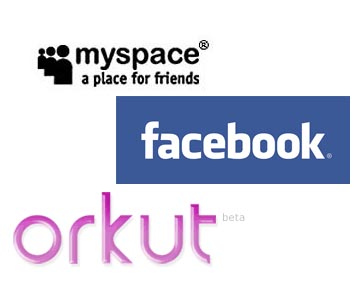‘Educational’ side of MySpace, Facebook and Orkut revealed
Washington,  June 21: Those hooked to social networking sites like Orkut, MySpace and Facebook, do not just kill their time online, but learn a range of new things, says a new University of Minnesota study, which has detailed the educational benefits of such websites.
June 21: Those hooked to social networking sites like Orkut, MySpace and Facebook, do not just kill their time online, but learn a range of new things, says a new University of Minnesota study, which has detailed the educational benefits of such websites.
Countering all the previous findings, this first-of-its kind study has also highlighted that low-income students are in many ways just as technologically savvy as their well-off counterparts.
The study was carried out for six months on students of thirteen urban high schools in the Midwest, between ages 16 to 18, belonging to families whose incomes were at or below the county median income (at or below 25,000 dollars) and who were taking part in an after school program, Admission Possible, aimed at improving college access for low-income youth.
It was found that 94 percent of the students participating in the study used the Internet, 82 percent go online at home and 77 percent had a profile on a social networking site.
On being asked what they learn from using social networking sites, the students listed technology skills as the top lesson, followed by creativity, being open to new or diverse views and communication skills.
Other than the surveyed students, a follow-up, randomly selected subset were asked questions about their Internet activity as they navigated MySpace.
"What we found was that students using social networking sites are actually practicing the kinds of 21st century skills we want them to develop to be successful today," said Christine Greenhow, a learning technologies researcher in the university's College of Education and Human Development and principal investigator of the study.
She added: "Students are developing a positive attitude towards using technology systems, editing and customizing content and thinking about online design and layout. They're also sharing creative original work like poetry and film and practicing safe and responsible use of information and technology. The Web sites offer tremendous educational potential."
According to her, the results not only proved that social networking sites offer more than just social fulfillment or professional networking, but they also have implications for educators, who now have a vast opportunity to support what students are learning on the Web sites.
"Now that we know what skills students are learning and what experiences they're being exposed to, we can help foster and extend those skills. As educators, we always want to know where our students are coming from and what they're interested in so we can build on that in our teaching. By understanding how students may be positively using these networking technologies in their daily lives and where the as yet unrecognized educational opportunities are, we can help make schools even more relevant, connected and meaningful to kids," said Greenhow.
In fact, they observed that very few students in the study were actually aware of the academic and professional networking opportunities that the Web sites provide. Greenhow said that making this opportunity more known to students is just one way that educators can work with students and their experiences on social networking sites.
The study also goes against previous research from Pew in 2005 that suggests a "digital divide" where low-income students are technologically impoverished.
She recommended that educators can help students realize even more benefits from their social network site use by working to deepen students' still emerging ideas about what it means to be a good digital citizen and leader online. (ANI)